Coordination
Background
Effective coordination can prevent gaps and overlaps in humanitarian responses, ensure the impact of CVA is optimised for the benefit of crisis affected populations, whilst also making the most of limited humanitarian funding. But the CALP Network’s State of the World’s Cash report found that cash coordination is seen as weak and ad hoc, and that this is having serious operational impact.
Ninety-five donors, international and national NGOs, private sector actors and one UN agency have called for clarity on two key issues surrounding cash coordination:
- Who should be accountable for ensuring effective cash coordination, and
- What the scope of Cash Working Groups should be, including in relation to multipurpose cash.
We urgently need to build on what works and provide clarity at the global level on the questions above, whilst adapting to different contexts. Clear decisions based on the impact on affected populations rather than agency politics are long overdue.
Current priorities
We aim to contribute to progress on this issue on three levels: supporting Cash Working Groups at the regional level; contributing to practical solutions for cash coordination at the global level; and convening evidence-based discussion on the key issues, highlighting critical decision points and opportunities for progress.
Featured content

Cash Coordination – LIVE timeline
Page
The latest updates on cash coordination as they unfold.

95 Organisations Sign Letter Calling for Strengthened Cash Coordination
News
Today a letter signed by 95 organisations was handed into the Emergency Relief Coordinator (ERC) urging the Inter-Agency Standing Committee (IASC) to take a decision on the leadership and scope of cash coordination in the coming year.

Is cash transforming the humanitarian system or is the system limiting how cash is used?
Blog Post
At the State of World’s Cash 2020 launch event, Sorcha O’Callaghan, Director of Humanitarian Policy Group at ODI warned that, “Cash offers a huge transformative potential, but as far as the system is privileging the interest of the agencies over people in crisis, we won’t be able to see it”. If you missed the State of the World's Cash 2020 launch we're sharing highlights. Quote 4...
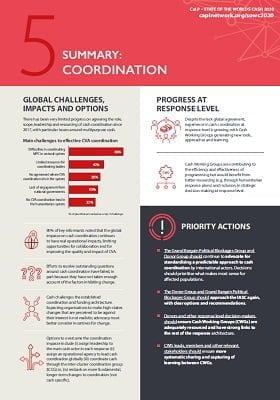
State of the World’s Cash 2020 Chapter 5 summary: Coordination
Report
There has been very limited progress on cash coordination since 2017. Cash continues to challenge the established coordination and funding architecture, and efforts to resolve outstanding questions around cash coordination have failed. Despite the lack of global agreement, Cash Working Groups are pushing forward and contributing to improved programming, and generating new approaches. This...

Cash Coordination Tip Sheet
Guidelines and Tools
This tip sheet sets out established best practice, key guidance and resources for all aspects of cash coordination, intended as a clear, accessible and action-oriented guide for those engaged in coordination of cash and voucher assistance (CVA) at the field level.

Introducing the Cash Coordination Tip Sheet
Webinar
The CALP Network has developed a tipsheet setting out established best practice and key guidance and resources for all aspects of cash coordination, intended as a clear, accessible and action-oriented guide for those engaged in coordination of cash and voucher assistance at the field level.

Cash Coordination: A proposal from members in MENA
Blog Post
Earlier this year the CALP Network undertook regional consultations to explore options for cash coordination. This blog lays out recommendations from participants from the Middle East and North Africa who sketched out what cash coordination, and coordination more broadly, could look like in future to support a more effective, efficient and accountable response.
Thematic lead
Latest

Community Baseline: A Survey On Resilience In South Central Somalia Summary
Report
A comprehensive understanding of the socio-economic and environmental context of intervention is essential to the success of any resilience-building program. Based on this premise, the BRCiS has taken a series of steps to strengthen its knowledge and understanding of key variables and dynamics in its...
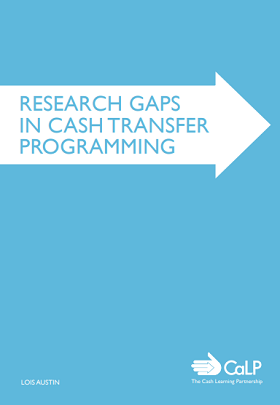
Research gaps in cash transfer programming
Report
Gathering evidence through action research is one of the ways that the CALP Network aims to improve cash transfer programming (CTP) implementation and raise awareness about CTP and its use as an appropriate and effective mechanism for emergency response. Before defining potential research topics for 2014,...
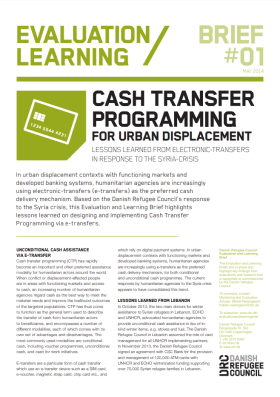
Cash Transfer Programming for Urban Displacement
Policy paper
In urban displacement contexts with functioning markets and developed banking systems, humanitarian agencies are increasingly using electronic-transfers (e-transfers) as the preferred cash delivery mechanism. Based on the Danish Refugee Council’s response to the Syria crisis, this Evaluation and...
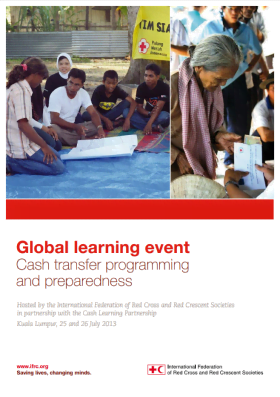
Global Learning Event Report: Cash transfer programming and preparedness
Report
As the investment in cash transfer programming (CTP) continues to grow, there is a desire to find ways to carry out this approach faster, more often and more effectively. As a result, the integration of CTP into preparedness and contingency planning is becoming more important. A global learning event on...

Evaluation of Concern Worldwide’s Emergency Response in Masisi, North Kivu, DRC (2012-2013)
Report
Populations in eastern DRC have faced serious humanitarian consequences resulting from years of conflict and instability. In Masisi territory in the province of North Kivu, Concern Worldwide has provided emergency assistance since 2008 in order to respond to humanitarian needs created by cycles of...
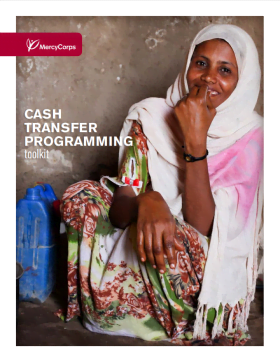
Cash Transfer Programming Toolkit
Guidelines and Tools
The Cash Transfer Programming (CTP) Toolkit is a basic guide to cash transfer programming in emergency response and early recovery settings. The publication is based upon best practiced and practical experience from Mercy Corps programmes. The Toolkit provides general guidance for CTP, as well as...

Guidance for DFID country offices on measuring and maximising value for money in cash transfer programmes
Guidelines and Tools
This document is a revised edition of Guidance for DFID country offices on measuring and maximising value for money in cash transfer programmes which DFID published in October 2011.
The guidance is in two linked parts:
1. Part 1 provides a toolkit which sets out key concepts and metrics for analysing...

Theories of Change for Cash Transfers
Report
While there is a large body of literature examining social protection and cash transfers’ (CT) impacts on poverty reduction and development, there is much less on understanding the mechanisms and pathways by which this happens. This report gathers together examples from the literature which attempt to...
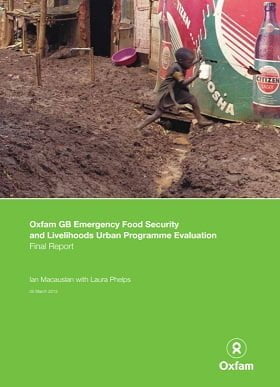
Oxfam GB Emergency Food Security and Livelihoods Urban Programme Evaluation
Report
The global urban population is now larger than the rural population. While rural areas in general remain worse off than urban areas, the number of people in urban poverty is growing fast, and urban dwellers are vulnerable to significant disasters. Development and humanitarian agencies are therefore...

Humanitarian Exchange: Special feature. New learning in cash transfer programming
Report
The special feature of this issue of Humanitarian Exchange, co-edited with Sarah Bailey and Breanna Ridsdel, focuses on new learning in cash transfer programming. While cash is now an accepted tool, and is increasingly being used in humanitarian response, most programmes are small and gaps in analysis and...

Review of emergency cash coordination mechanisms in the Horn of Africa: Kenya and Somalia
Report
In response to the drought and famine in the Horn of Africa in 2011, cash transfer programming (CTP) has been used extensively as a modality to meet humanitarian needs. Partly because the conditions permitted it (functioning markets, cash economies and delivery mechanisms), and partly because delivering...
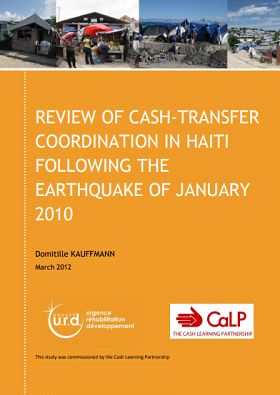
Review of Cash-transfer Coordination in Haiti following the Earthquake of January 2010
Case Study
This study, commissioned by the CALP Network, aims to review and document the coordination of cash transfer programmes (CTP) implemented from the emergency phase in Haiti. It is part of a wider review of CTP coordination in emergency situations which includes three case studies (Pakistan, Haiti and the...
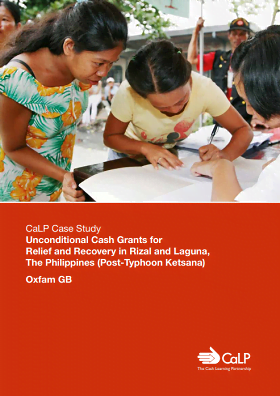
Unconditional Cash Grants for Relief and Recovery in Rizal and Laguna, The Philippines (Post-Typhoon Ketsana)
Report
In response to rapid onset flooding in Laguna and Rizal provinces in the Philippines, Oxfam International implemented a Cash Transfer Programme (CTP) in three phases: 1) Unconditional cash transfers for individuals to provide for basic needs; 2) Conditional cash transfers for individuals resuming income...

ICT/mobile Phone Technology: A shift in the right direction
Blog Post
Thirteen African nations came together for the AgriKnowledge Share Fair in Addis Ababa at the end of October 2012 to learn about approaches for quicker and more efficient humanitarian response. Government representatives, researchers, UN agencies and NGOs gathered for a three day symposium on best...
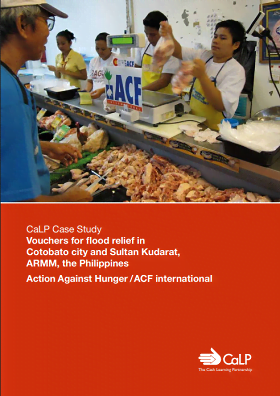
Vouchers for Flood Relief in Cotobato City and Sultan Kudarat, ARMM (Mindanao), the Philippines
Case Study
In response to a rapid-onset emergency, Action Against Hunger / ACF International, with funding from AECID, implemented a cash transfer program in Cotobato City, situated in the Autonomous Region of Muslim Mindanao in the Philippines. The project established a cash voucher program through local...
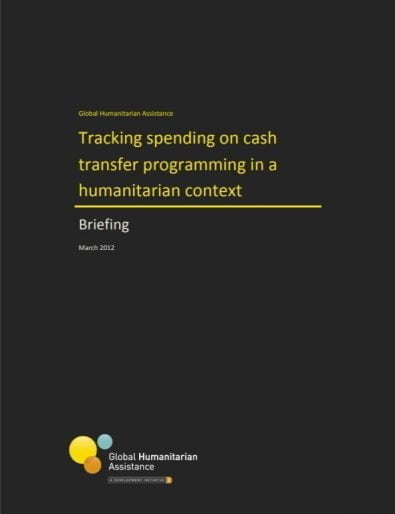
Tracking Spending on Cash Transfer Programming in a Humanitarian Context
Report
This briefing paper provides a brief overview of cash transfers by situating them within official development assistance (ODA) analysis. However, the core of this analysis concentrates on tracking cash transfer programme spending in humanitarian aid. For analysis of cash transfer spending in crisis...
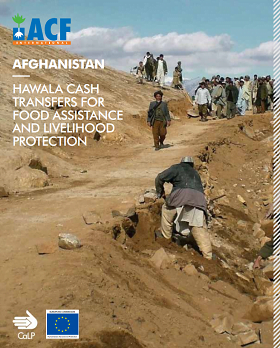
Afghanistan: Hawala cash transfers for food assistance and livelihood protection
Case Study
In response to repeated flooding, ACF implemented a cash-based intervention in the Samangan and Day Kundi Provinces of Afghanistan. The project applied cash for work activities as well as unconditional cash transfers and made use of the local Hawala system to securely transfer money to beneficiaries. The...
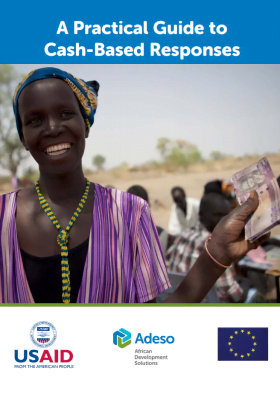
A Practical Guide to Cash-Based Response
Guidelines and Tools
A Practical Guide to Cash-based Responses is a manual developed by Adeso to share the organisation’s experience in developing and implementing appropriate cash-based responses. The manual highlights some practical problems that are faced by implementation teams around the world and it is intended to...
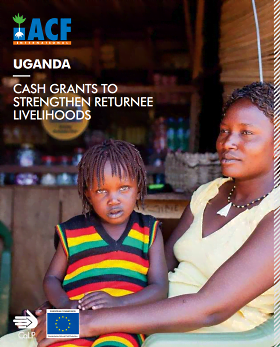
Uganda: Cash grants to strengthen returnee livelihoods
Case Study
In support of the return and recovery effort of formerly war affected populations, ACF implemented a cash-based intervention in Otuke District of Northern Uganda. This programme assisted internally displaced persons (IDPs) with the return home and re-establishing their livelihoods. Vulnerable households...
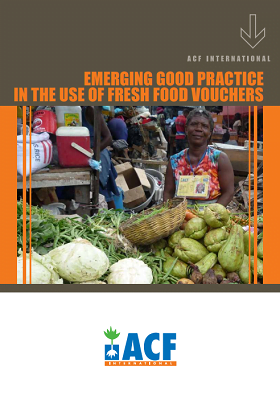
Emerging Good Practice in the use of Fresh Food Vouchers
Report
The purpose of this Good Practice Review is to provide practitioners with information on emerging good practice in the use of Fresh Food Vouchers (FFV), as well as practical examples from the field. In the Introduction, the GPR reiterates the nature of a fresh food voucher and explains some advantages and...
